The Institute of Music: The DePauw music community charts the course forward
by Chris White, senior Professor of English, Creative School special programs
The study of music at DePauw has a long and distinguished history. It began in 1881, when the Department of Music at Indiana Asbury College was born, operating autonomously from the rest of the college. In 1884, the School of Music (SOM) was established with a substantial donation from Washington C. DePauw (for whom the university was then named), making it one of the oldest music schools in the U.S. In 1932, the School became integrated into the university at large. It continued to expand its curriculum and reputation: master’s programs came and went, and in 1976, the SOM moved into a new Performing Arts Center. This is the space that, once extensively renovated, became the Green Center for the Performing Arts; in 2007, due to the dedication and generosity of alumni Joyce Taglauer Green ’75 and Judson C. Green ’74, the Center was expanded to include a state-of the-art recording studio, airy gathering spaces, diverse performance venues and numerous practice rooms, faculty offices and studios. The Greens also funded a world-class guest artist series that continues to dazzle and inspire the DePauw and Greencastle communities today.
The DePauw School of Music has turned out exceptional musicians and teachers for nearly 150 years. Through the mentorship of a talented and dedicated faculty, a hardworking and supportive staff and small classes and private lessons for students, it has offered a rigorous and ambitious curriculum. It presents around 100 performances each year, from master classes to a musical theatre production to a full opera. It supports an orchestra, two concert bands, a jazz ensemble and three choirs, and it provides high-level travel abroad opportunities that students never forget. It has hosted an illustrious catalogue of performers and composers, including the likes of Aaron Copland, the Count Basie Orchestra, Yo-Yo Ma, Postmodern Jukebox, Rhiannon Giddens and Bobby McFerrin.
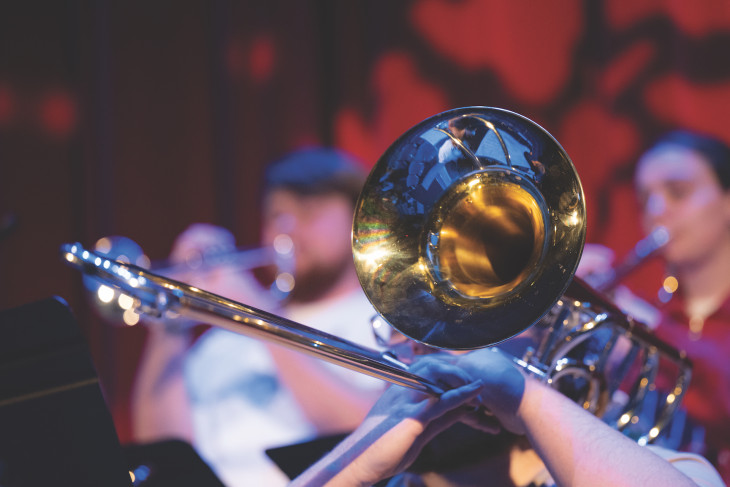
The storied history of the DePauw School of Music lives on in its alumni. It lives in the current students diligently finishing their degrees from the original SOM model. And it will live on in all students joining the “Institute of Music” now and into the future. Because the beating heart of it hasn’t changed – it remains a rich education of musical excellence that aims to equip students with the tools they need to flourish in all their endeavors. What has changed? The specific needs and desires of contemporary students. And so the DePauw Music program is doing what it has done for nearly a century and a half – responding, growing – and growth is both challenge and necessity.
When DePauw introduced the “three-school model” that would bring a DePauw education into alignment with the realities and opportunities of the present moment, the then-School of Music was arguably the area most impacted. Two of its time-honored degree programs – the Bachelor of Music Education and the Bachelor of Music in Performance – were discontinued, and the School of Music was transformed into the Institute of Music in record time, with the primary objective of better integrating it into the new three-school vision.
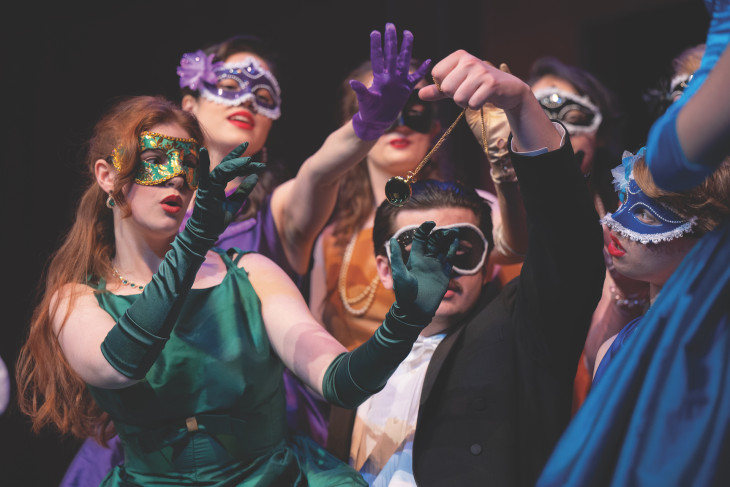
Music education professor and director of the Institute of Music Caroline Jetton says, “It was initially a bitter pill that required a significant amount of processing and unpacking. The faculty had to reimagine two degrees as well as our minors in one year. But I’m so proud of how we worked together to thoughtfully accomplish what we needed to do as we were also grappling with our feelings of loss.”
Students felt the losses, too. Those who had enrolled under the now-discontinued SOM programs worried (unnecessarily) that they wouldn’t be able to successfully complete their degrees, while budget cuts throughout the university necessitated the loss of some of their beloved music faculty members. School of Music alumni understandably wanted answers, as well. Would their degrees be viewed differently, for example, now that their particular degree programs no longer existed? DePauw responded by opening the lines of communication, and remote calls between administrators and alums have been ongoing since the early fall of ’24, allowing space for a range of emotions along with productive talk about moving forward. Many alumni are asking: How can we help?
“If alums have ideas or thoughts, I’m here to listen,” dean of the Creative School Marcus Hayes offers. “Always.”
Parameters for program change were both pragmatic and innovative. Initiatives included the incorporation of general education requirements that centered the liberal arts, more manageable music student schedules and the availability of core music courses for all DePauw students. Music faculty also added more major electives so that music students could handpick a collection of courses that would better support their unique interests and goals, moving away from the sequential curriculum, which had been difficult for students to navigate. They added new courses in music creation to the Bachelor of Musical Arts degree, including Improvisation, Composition, Orchestration and Film Scoring, and Digital Musicianship through Technology, all of which immediately began energizing student interest.
...the DePauw Music program is doing what it has done for nearly a century and a half – responding, growing – and growth is both challenge and necessity.
In traditional DePauw fashion, students and faculty are now focusing on the positives: new opportunities, new courses and new ideas either already in the works or coming in the not-too-distant future.
“I’m optimistic,” says voice professor Janani Sridhar. “Due to changes in enrollment, many universities, programs and departments shut down across the country without warning. DePauw asked, ‘How do we give students what they want? How do we move forward with the joy? Create a really beautiful program?’”
Director of DePauw Bands Craig Paré believes the music program’s integration into the three schools will help music faculty better prepare students for “the real world.”
“When I would ask a group of high school music students how many of them wanted to pursue a career in music, only about a quarter would raise their hands. They want to continue to be involved with music, they love it, but they aren’t focusing on making it a career.”
For that quarter of high school music students who do plan to become professional singers and instrumentalists, DePauw remains an outstanding place to prepare. Although it will no longer offer the conservatory-inspired performance degree, such an education can still be approximated with careful advising and planning, due to the flexibility of the newly revamped BMA. And the re-envisioned Institute of Music will offer students with broader interests an all-access pass to what they say they want: music involvement, experience and creation.
Students across DePauw disciplines will be able to sample courses and cocurricular musical opportunities and internalize connections across artistic, business and leadership, and liberal arts disciplines. Music majors will have the time and space to double major or take on a minor or two (something only the most enterprising School of Music students were able to accomplish in the recent past). And now, music students will find it easier to study abroad for a full semester.
Director Jetton explains the conundrum: “The old programs had a ton of required courses, along with recitals, and few electives. I think we’ll now see better student agency and retention because students are able to curate their own degrees and paths.”
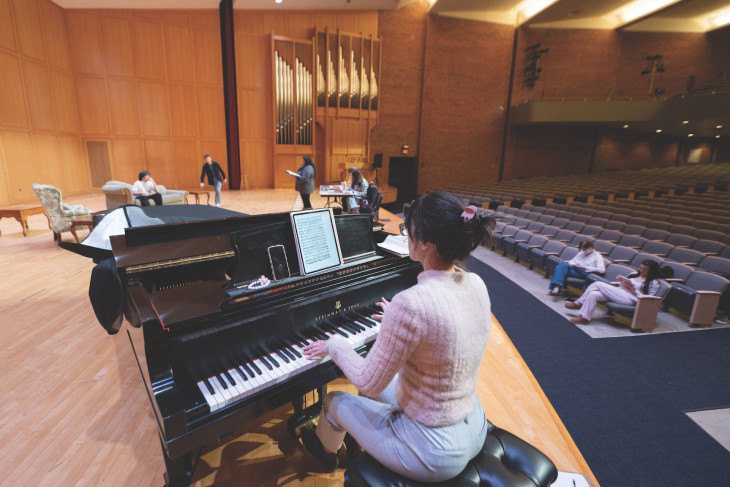
“We are making space for what can be,” says Dean Hayes. “New students, faculty and staff deserve the opportunity to contribute in new ways, while still participating in music at a high level. Students aren’t losing what was most dear to many of our alums – sharing their art with an audience, recording in the studio, touring places like London and South America. We are continuing to do tenure-track faculty searches in music, and we have no intention of cutting back on the high-impact learning opportunities that have set a DePauw standard. Music is alive and well at DePauw!”
What do the new music degree programs look like? Significant curricular changes have been made to both the Bachelor of Musical Arts and the Bachelor of Arts in Music, new programmatic emphases have been created and compelling minors have been updated, like music creation and technology, jazz studies, musical theatre and music. The Institute also anticipates offering topics courses in areas such as arranging, vocal diction and songwriting, where faculty can create courses that build on their particular expertise and/or respond to current student interests. And music students are now able to make composition their applied area, like an instrument, an option students have wanted for years.
Some new opportunities hold the potential for team teaching and interdisciplinary foci, like the new leadership/interdisciplinarity emphasis, which will include courses such as Building Musical Lives and Communities as well as Music and the Related Arts, a course that explores ways music engages with other creative arts disciplines and introduces students to other arts faculty. An interdisciplinary collaboration final project may be available within a couple of years as the Creative School moves forward.
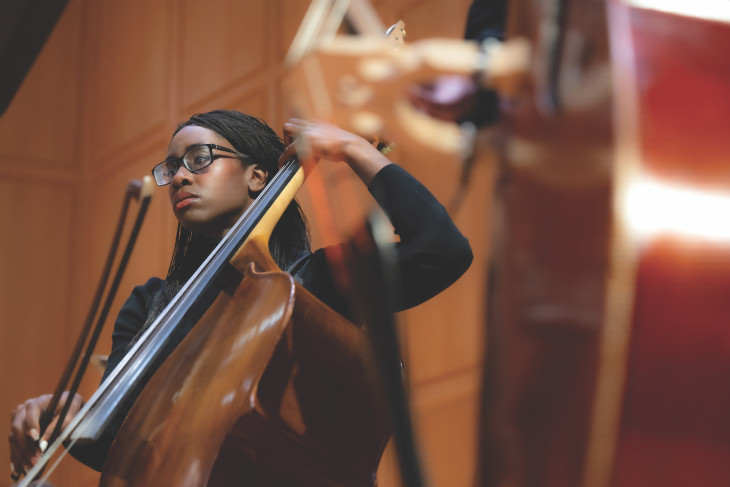
Music theory and composition professor Eliza Brown explains, “Collaborative student and/or faculty multidisciplinary performances are coming into a more central position. These opportunities are catalysts for students to develop their artistic identities. Much of our labor is in early stages, though, as we work to find ways to make these experiences more curricular.”
Senior music education major, honor scholar and former student body president Paige Burgess agrees. “We need institutional models. And we need alumni voices who were part of past programs to speak on their positive experiences and help create new routes for collaboration.”
Director Caroline Jetton believes some of the process will happen organically: “Building events that incorporate all or more of the arts will encourage cross-curricular possibilities to blossom. Once we start coming together more often and more intentionally, it will gain momentum.”
Creative School Dean Hayes is interested in the ways collaboration stretches even further. “Part of the process will be to integrate the ethos and/or methodologies from disparate disciplines across the university. How could neuroscience influence music composition? Or vice versa? How can those questions, that process, help us to come up with innovative solutions? Teaching collaboration as a skill is still a pretty novel concept, and it will take time to distill it out into a very intentional curriculum.”
The music industry is ever more interdisciplinary, increasingly reflecting the world around it, as the global community becomes both audience and creator. DePauw intends to be a more accurate part of that reflection in more ways than one, not only by blending artforms, but also by encouraging more cross-pollination between the Institute of Music and the College of Liberal Arts and Sciences.
“Concerts, recitals and communities are now highlighting composers of color,” Professor Sridhar notes. “The marginalized are speaking up, sharing their stories, creating new works – about immigration, social injustice, indigenous people going missing. I’m currently teaching a class on Social Justice in Music,” she continues. “It includes music from the Holocaust, music about immigration, music from Iran where it’s illegal for women to sing solo in public.”
The needs and wants of today’s students have inspired many of these changes, and they will play a big part in how the IOM takes shape, as disciplinary boundaries become more porous.
Griffin Chyall, a senior in the Bachelor of Musical Arts program pursuing a second major in Theatre, says, “Many different disciplinary areas are now more consciously joining one force, not a divided landscape between the conservatory model on one side and the rest of the liberal arts on the other. For example, in the recent Into the Woods musical production, there were music majors, communication majors and other Creative School majors involved.”
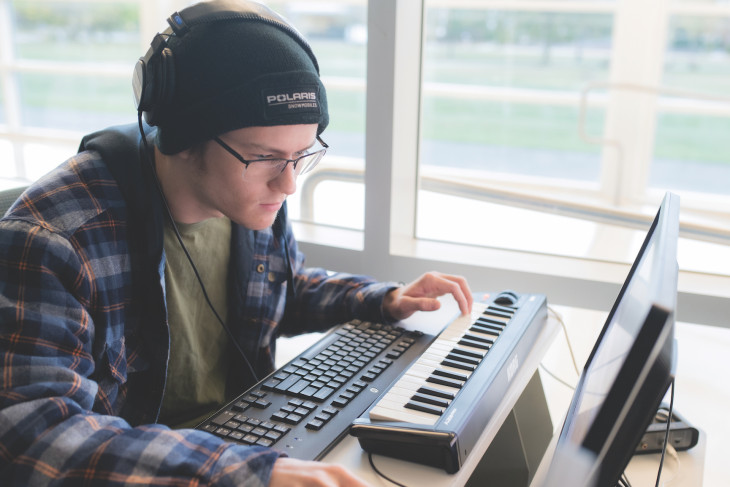
Rachel Schmitt, senior music education major and flutist, adds, “[The new model] gets students on the ground, doing what they really want to do, for example, film scoring. It wasn’t really an option before.”
Ben Freeman is a senior communication and German double major who is also a serious musician passionate about making his own music. He’s had difficulty finding a way in during his time at DePauw without the title of “music major.”
“I’ve played in a band and done some scoring for student films on my own … I’ve watched music majors get opportunities to work on stage and have advertising behind them, but I had to seek out the opportunities myself, working with peers.”
“I’m hopeful it will help students like myself,” Freeman continues, “independent artists who want to work on their own music outside of the classical, orchestral model. I’d love to see more classes on digital music production, the art of using software, recording techniques and songwriting to create music which can be played on streaming services, which is where we are in the real world right now.”
The real world is exploding with music and song. Here at DePauw, the sound resonates through the hallways – the jazz piano improvisation of a history major, the electronic tracks created by a music and computer science double major or the refined strains of a soprano performing opera. Here, faculty and students of diverse interests and perspectives are pursuing excellence, coming together to explore music and everything it teaches us, not just for the few, but for us all.
“I think we are on the forefront of what other universities will be doing,” asserts Professor Sridhar. “It helps grow the world of the performing arts, starts conversations and opens doors to people who normally feel they would not have access. It’s not all about being the best of the best musicians. There will always be a space for artists with something to say.”
DePauw Magazine
Spring 2025
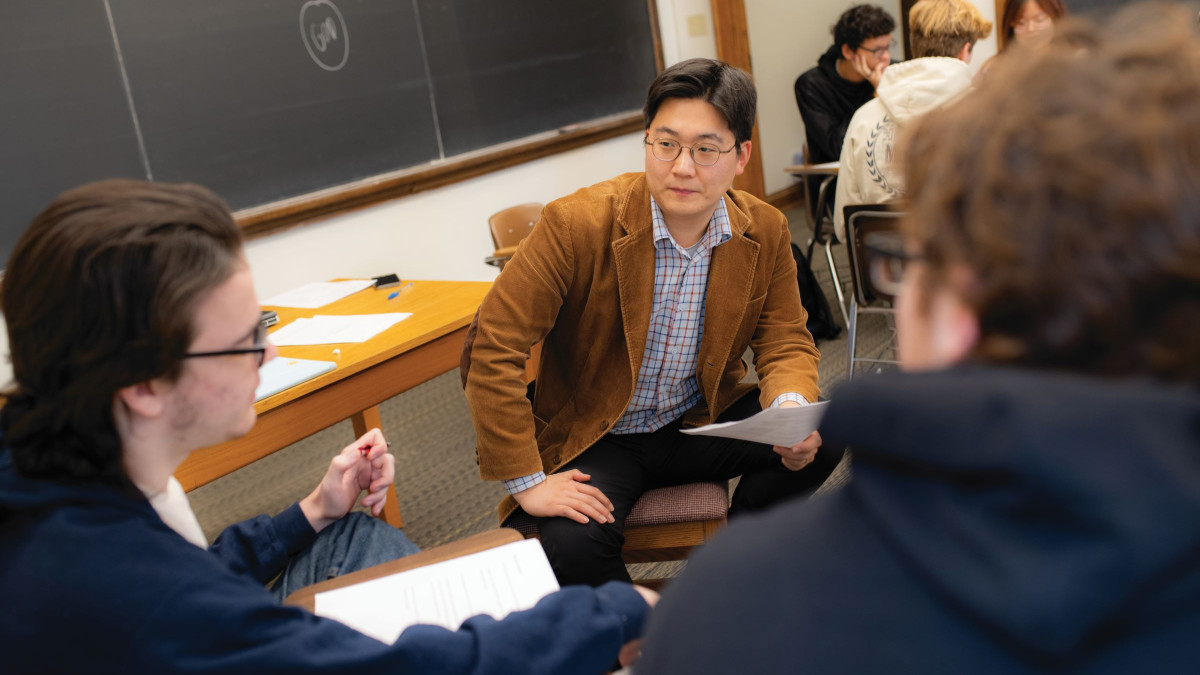 The First-Year Seminar
The First-Year Seminar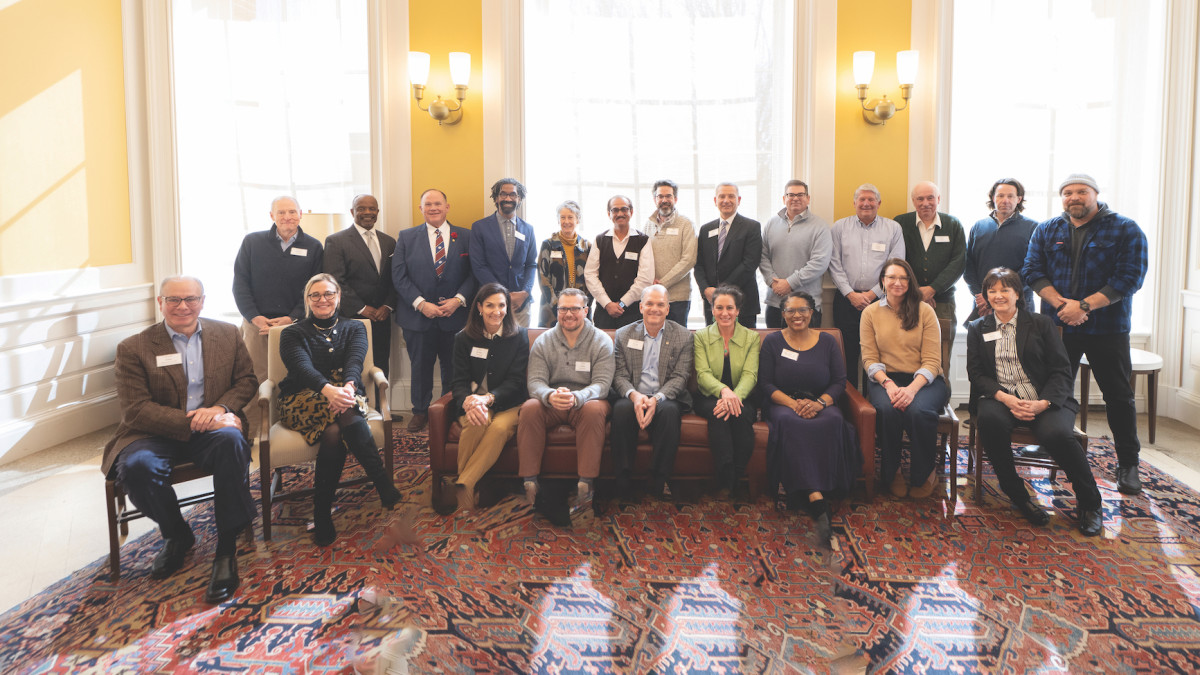 Trusted Advisers
Trusted Advisers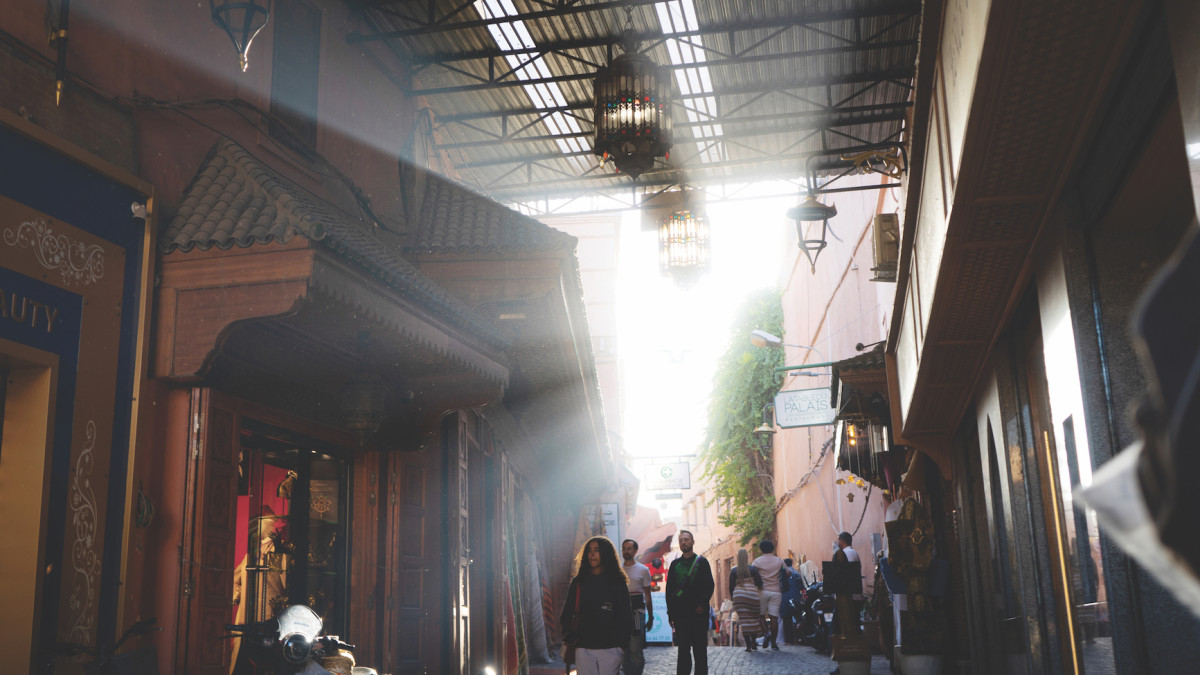 Winter Term in Full Color
Winter Term in Full Color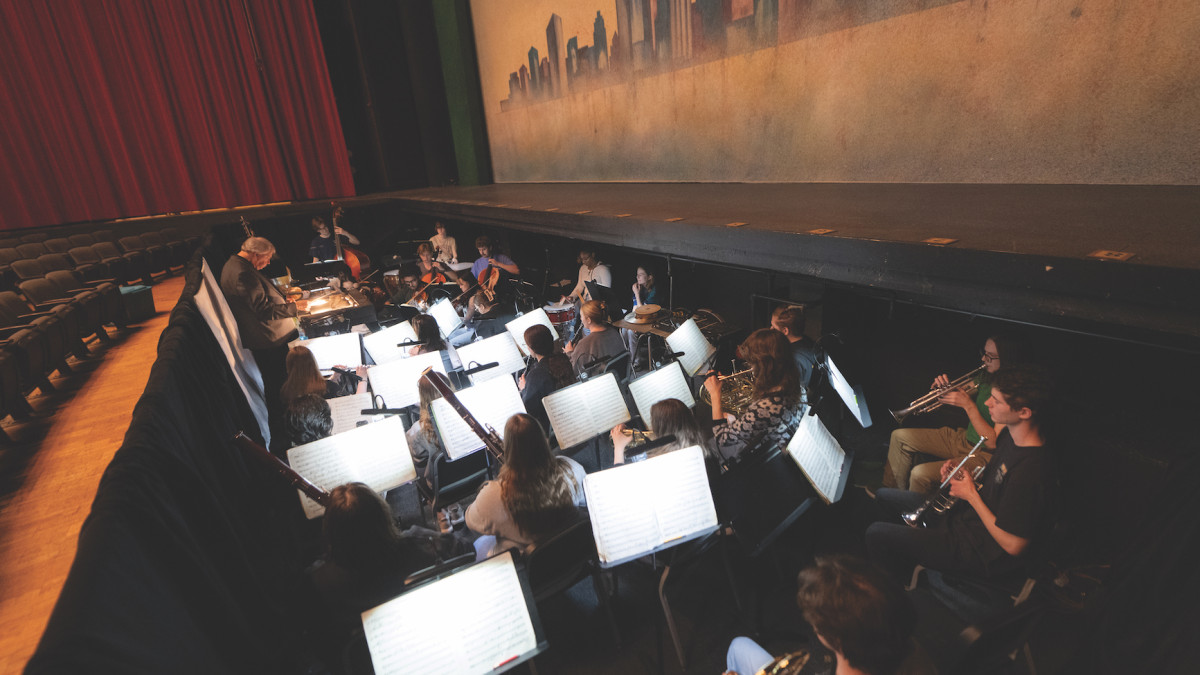 Institute of Music
Institute of Music
DePauw Stories
A GATHERING PLACE FOR STORYTELLING ABOUT DEPAUW UNIVERSITY
Browse other stories
-
Athletics
-
Women's Lacrosse - Tigers Rally Late, Falling in Final Second to Battling Bishops
-
Men's Lacrosse - Tigers Fall Short in Second-Half Surge by Wooster
-
Men's Tennis - DePauw Men Blank Hanover and Ohio Wesleyan
More Athletics
-
-
News
-
Greencastle Celebrates National Main Street Day with Small Business Breakfast, New Program Launch, and Spring Pitch Competition
-
Hirotsugu "Chuck" Iikubo ’57 remembered as thoughtful leader, advocate for international goodwill
-
DePauw mourns Janet Prindle Seidler ’58, founder of The Prindle Institute for Ethics
More News
-
-
People & Profiles
-
11 alums make list of influential Hoosiers
-
DePauw welcomes Dr. Manal Shalaby as Fulbright Scholar-in-Residence
-
DePauw Names New Vice President for Communications and Strategy and Chief of Staff
More People & Profiles
-
-
Have a story idea?
Whether we are writing about the intellectual challenge of our classrooms, a campus life that builds leadership, incredible faculty achievements or the seemingly endless stories of alumni success, we think DePauw has some fun stories to tell.
-
Communications & Marketing
101 E. Seminary St.
Greencastle, IN, 46135-0037
communicate@depauw.eduNews and Media
-
News media: For help with a story, contact:
Bob Weaver, Senior Director of Communications.
bobweaver@depauw.edu.